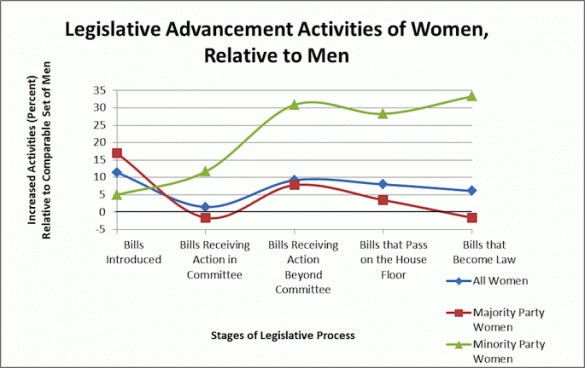
The 113th Congress includes a record number of women, with 98 in the Senate and House of Representatives. New research shows that these women, especially the ones in the minority party, could have a strong impact on future laws.
Research by Vanderbilt political science professor Alan Wiseman and his coauthors find women in Congress in the minority party are more effective than their male counterparts when it comes to introducing and negotiating bills, spurring action on those bills, and ultimately seeing them become law.
“In Congress, men tend to adopt more individualistic and competitive approaches to policymaking and women rely on more collaborative methods,” said Wiseman, co-director of the Center for the Study of Democratic Institutions at Vanderbilt University. The co-authors write, “With this tendency toward collaboration, female legislators in the minority party are expected to experience greater effectiveness than their male minority party colleagues.”
Grading political effectiveness
Wiseman and co-authors Craig Volden and Dana Wittmer based their analysis on a Legislative Effectiveness Score (which was developed by Wiseman and Volden) and rated legislators from 1973 to 2008. They calculated the scores based on:
- Number of bills a legislator introduced;
- How many of those bills received action in committee;
- How many of those bills received action beyond committee;
- How many of those bills passed the House; and
- How many of those bills became law.

The researchers found that women in the minority party were about 33 percent more effective than the average male member of their party. Minority party women were also better at pushing their legislative initiatives through committee and onto the House floor. The average minority party woman had 28 percent more bills reaching the floor.
“This is a process that depends on coalition building,” said Wiseman.
Women in both parties introduced more bills than their male colleagues. But that’s where the gender significance ended. Women in the majority party were not more effective—in terms of their legislative effectiveness score—than their male counterparts.
Practical application
How can this research be applied to today’s Congress? The researchers believe that while the Democratic party may wish they had earned the majority of seats in Congress, the larger number of women in their minority party may lead to greater opportunity for bipartisan coalitions.
The research comes from the paper, “When are Women More Effective Lawmakers than Men?” which will be published in the American Journal of Political Science later in 2013 and prior research, “The Legislative Effectiveness of Women in Congress” (2010.) A policy brief on the study can be found on the CSDI website.